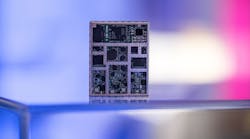Three years ago, when Chinese regulators fined Qualcomm a billion dollars for gouging customers licensing its trove of wireless patents, the company escaped without having to make sweeping changes to its licensing business, its most profitable. Qualcomm was given the green light to charge royalties based on the wholesale price of a smartphone—a core part of its business model.
Now it seems that the San Diego, California-based has escaped another regulator relatively unscathed. Last week, the company said it had resolved its dispute with Taiwan’s Fair Trade Commission, which imposed $773 million in penalties on Qualcomm for choking competition in the country. The agency said that it would keep the $93 million Qualcomm has already handed over but waive the rest.
Last year, the agency accused Qualcomm of using its dominance in wireless modems to overcharge for patents, holding its chip supply hostage to stop customers from protesting unfair deals, the echoing the issues regulators in Europe, South Korea and the United States have had. It was also accused of refunding fees to major customers like Apple that used its modems and no one else’s.
Under the terms of the deal, the fine is cut down significantly. Instead, the company said that it would to invest $700 million in Taiwan’s technology sector and research over the next five years, including the development of 5G technology, and build new operations and manufacturing facilities in the country. Qualcomm also vowed to negotiate fair licensing contracts with customers in Taiwan.
Taiwan also tossed out requirements that would have pressured Qualcomm to switch its core business model over to chip-level patent licensing. That would mean charging companies to use its cellular technologies based on the cost of the components instead of the entire smartphone, possibly cutting into its profitability. But the settlement makes sure its business model is safe.
“This settlement directly addresses concerns raised by the Taiwan Fair Trade Commission, regardless of disputed positions, and builds on our foundation of collaborative, long-term business relationships in Taiwan,” said Alex Rogers, president of the company’s licensing business unit, which represents most of its profits, in a statement.
We are happy to reaffirm our commitment to licensing our valuable intellectual property under principles of fairness and good faith,” he added. “With the uncertainty removed, we can now focus on expanding our relationships that support the Taiwanese wireless industry and rapid adoption of 5G technology.”

